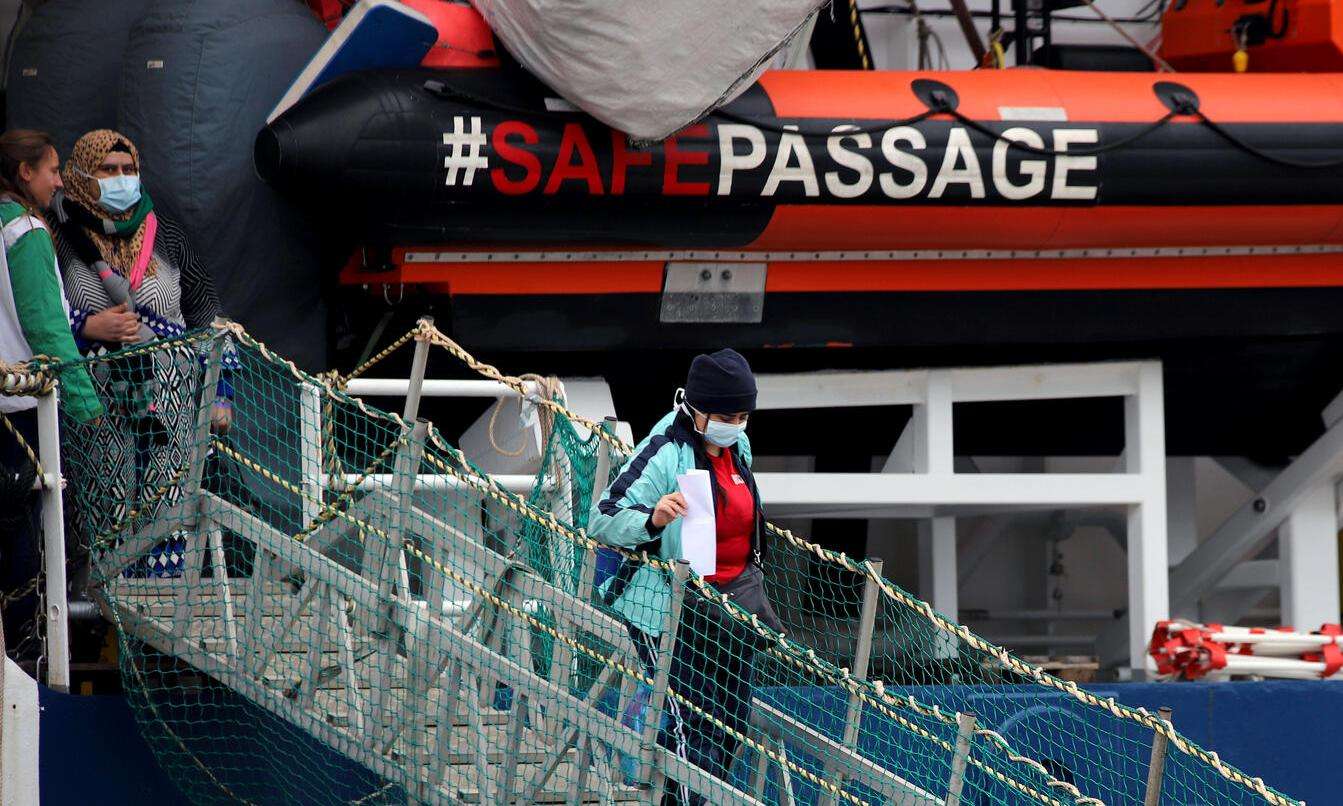In a new report, Death, Despair and Destitution: The Human Cost of the EU’s Migration Policies, Doctors Without Borders/Médecins Sans Frontières (MSF) highlights the harrowing consequences of Europe's harmful migration policies for people attempting to seek safety within its borders.
MSF’s report compiles firsthand testimony from medical staff and patients as well as data from over 20,000 medical, mental health, and emergency consultations provided to migrants, refugees, and asylum seekers across 12 programs in Europe and northern Africa between August 2021 and September 2023. It also includes stories from some of the more than 8,400 people MSF rescued from the Central Mediterranean Sea in 2023.
The report found that at every step of the migration journey, migrants, refugees, and asylum seekers are systematically and violently targeted by EU policies that trap them in unsafe situations, block them from reaching safety, arbitrarily keep them detained, and ultimately deny them safety.
.png?itok=9ORkVCw0)
Death , despair, and Destitution: Death, Despair and Destitution: The Human Cost of the EU’s Migration Policies
Read the reportMSF has consistently called on the EU and its member states to take responsibility and address urgent assistance and protection needs for migrants and refugees. But things have not improved. Instead, violence against refugees and migrants at the hands of authorities has been normalized in Europe and in other countries along the migration route. This violence has been instrumentalized by dangerously dehumanizing political discourse against those seeking safety.
Trapped in a cycle of abuse
Outsourcing harmful practices
Most of the world’s refugees live outside of Europe, often in countries neighboring their own and in dire living conditions. Longstanding policies (for example, visa restrictions and carrier sanctions that penalize transport operators if they bring someone into a country without permission) have severely limited safe, legal pathways for people to seek refuge in the EU.
Funds given to Libya's border management capacity by EU before 2022
People intercepted at sea and forcibly returned to Libya in first eight months of 2023
Migrants rescued by MSF in the central Mediterranean Sea in 2023
The EU and its member states continue to rely on deals with other countries to essentially do whatever it takes to prevent migrants from crossing into the EU after fleeing conflict or persecution in countries predominantly in Africa, the Middle East, and South and Central Asia. A longstanding agreement between the EU and Libya continues to provide the blueprint for the proliferation of such arrangements. These deals, which are bolstered by the EU Pact on Migration and Asylum, have resulted in violent interceptions of people at sea and forcing them to return to places where they are at further risk of harm, without access to health care or protection.
A person rescued by MSF in the Central Mediterranean in 2022
"It’s better to die in these waters than to die in our countries"
“The first time I tried to cross the sea was 2017. We saw a boat with a Libyan flag. They abducted us. My boat was around 150 people. They took the engine and left the boat ... Then they took us to prison, asking for ransom.
They have instruments for torture. Most times they hit your skin with iron. They have killed people in my presence.
I had no option. I had to go to Europe—even my country is not safe. Most of us here believe that it’s better to die in these waters than to die in our countries.”
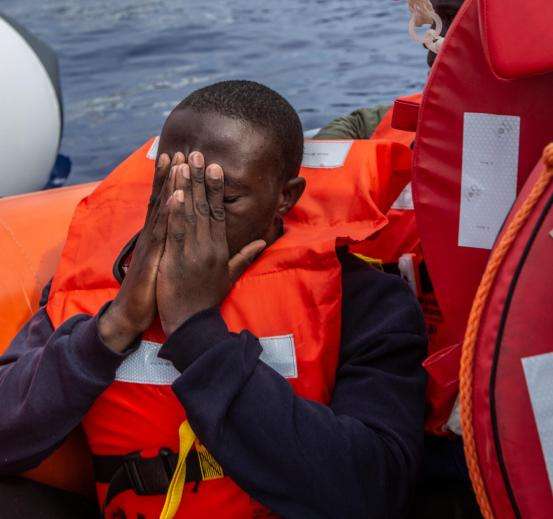
By 2022, the EU had invested over €70 million (more than $76 million USD) in building up Libya’s border management capacity, including technical support for the Libyan Coast Guard. In the first eight months of 2023, more than 11,000 people were intercepted and returned to Libya.
Many patients rescued by the Geo Barents search and rescue vessel reported having attempted to flee Libya by sea repeatedly, some up to seven times. After being forcibly returned to Libya by the Libyan Coast Guard, they are often subjected to arbitrary detention in formal or informal detention centers, where they face widely documented abuses including exploitation, torture, human trafficking, forced labor, substandard living conditions, and no access to basic services or health care.
MSF teams worked in some of these detention centers from 2016 to 2023. In December 2023, MSF released a report sounding the alarm on patients’ allegations of inhumane treatment.

“You’re going to die here”: Abuse in Libyan detention centers
Read the reportReplicated patterns of violence
MSF has witnessed similar practices in Niger, Serbia, and Tunisia—countries that also receive EU funding in its attempt to curb migration.
In the first 11 months of 2023, over 69,963 people were intercepted by the Tunisian Coast Guard and forcibly returned to Tunisia—more than double the same period in 2022.
In the summer of 2023, MSF teams on board the Geo Barents rescued adults and children who had fled a spike in violence against Black African migrants in Tunisia. All survivors reported living in fear and experiencing harassment, discrimination, violence, forced evictions, arbitrary arrests, expulsions to the Libyan and Algerian borders, and difficulties accessing basic goods and services. Many described being subjected to forced domestic labor in private households, sexual exploitation, and having to resort to transactional sex to survive or pay for their journey across the Mediterranean Sea.
Along the Serbia-Hungary border region—where people often attempt to cross into the EU—MSF documented at least 50 evictions of informal settlements between December 2022 and June 2023. Thousands of people were rounded up by security forces and relocated to one of 19 EU-funded government-run reception facilities. Patients seen after evictions said they were beaten with batons, kicked, and witnessed children being beaten.
Blocked at EU borders
Dangerous border walls
Despite efforts to trap migrants, refugees, and asylum seekers in non-EU countries, people continue to risk their lives to cross into Europe in search of safety and protection. When migrants reach EU borders, they are met with 1,200 miles of walls and razor wire fences, repeated “pushbacks” (in which authorities forcibly push migrants back across a border shortly after they cross it), and non-assistance at sea.
In Poland, an 18-foot-high, razor-wired, electronically surveilled wall at the Belarusian border has increased the risk of serious—and potentially deadly—injuries. Between January and September 2023, almost 40 percent of the 187 patients treated by MSF had sustained injuries while attempting to climb the wall or falling off it.
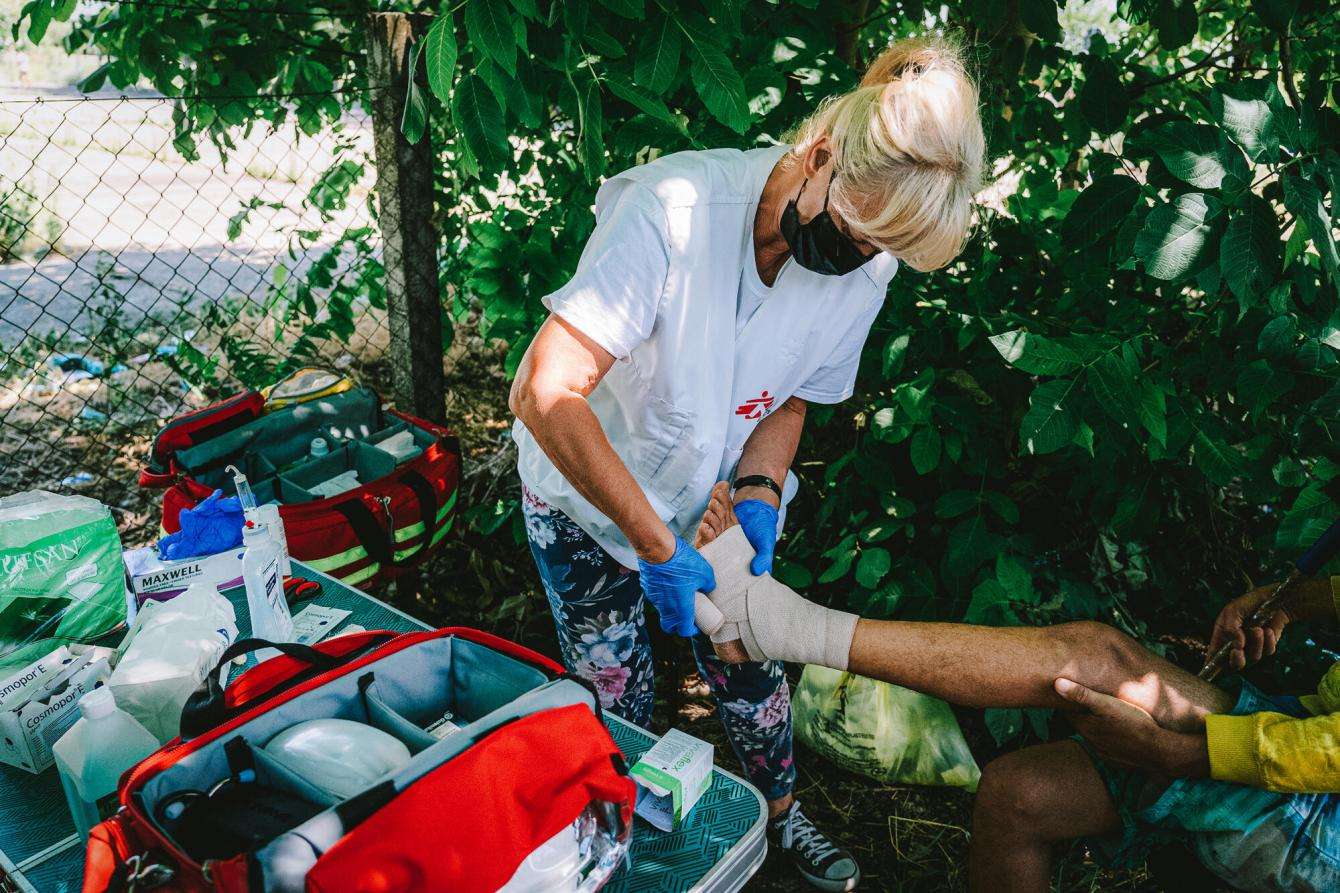
Pushbacks occurring out of sight
Repeated pushbacks in countries such as Poland, Greece, Bulgaria, and Hungary have exposed people to unacceptable risks to their health and wellbeing. Most pushbacks are reportedly carried out by state authorities who reportedly use dehumanizing and humiliating tactics, including physical assault, verbal abuse including racial slurs, and other degrading treatment. MSF mental health teams have observed pushbacks causing some patients to develop post-traumatic stress disorder (PTSD).
Since France’s decision in 2015 to restore control of internal borders of the EU, crossing the Italian-French border has become increasingly perilous.
MSF provides medical care in the Italian town of Ventimiglia, on the border with France. Among the 955 patients consulted by the MSF team in Ventimiglia between February and September 2023, nearly 20 percent reported having experienced pushbacks, of whom 12 percent reported experiencing violence. Many people are indiscriminately pushed back into Italy without due process.
MSF patient in Ventimiglia, Italy in 2023
We didn’t think we would have to keep running
“My brother and I came on foot from Afghanistan, and we tried to cross the border between Italy and France to join our family in Germany. On the mountain path at night the police started chasing us and while trying to escape, we fell into a ravine. The MSF team medicated us, but we lost everything we had in the ravine. We had to cross Türkiye, Greece, and the Balkans to get to a place where we felt safe. We didn’t think we would have to keep running even after we arrived in Europe.”
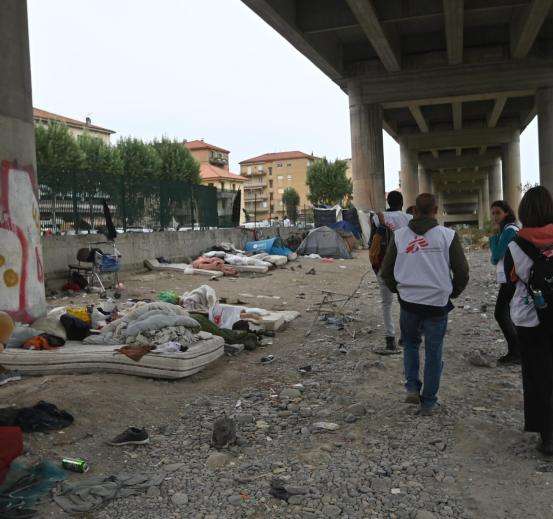
Detained and denied care
Arbitrary detention in deplorable conditions
Often those seeking sanctuary in European countries have already experienced violence before arriving in Europe. In Palermo, Italy, among the 57 patients MSF assisted between January and August 2023, 61 percent reported being tortured in Libya—most of whom reported being tortured within a detention facility. PTSD was highly prevalent among these patients.
But rather than being afforded the possibility to heal in safety and with dignity upon arrival, their trauma is compounded by confinement in closed ‘hotspots’ and detention centers.
The ‘hotspot’ model was established in Greece and Italy to contain and quickly identify people arriving at borders, implement rapid border procedures, and facilitate quick returns and deportations. Over the years, the hotspots have been characterized by an ongoing state of crisis and human suffering, failing to provide protection and access to essential services such as water, health care, and safe reception.
Despite well documented shortcomings, the EU and member states have doubled down on this approach. In 2022 the EU supported the construction of prison-like structures called ‘Closed Control Access Centers’ (CCACs) to hold newly arrived people on five Greek islands, including Samos and Lesbos, where MSF provides medical care
patients assisted in Palermo, Italy between January and August 2023
reported having been tortured in Libya
of torture occurred in a detention facility
MSF has witnessed how CCACs contribute to the deterioration of people’s health. Depression, PTSD, and anxiety are prevalent among MSF patients staying in CCACs, including children, while preventable, contagious skin conditions caused by substandard hygiene and living conditions are rife.
“Now everyone is suffering from a basic level of psychological distress, even young people," said an MSF psychologist in Lesbos, Greece. "Always with the same symptomology: body pains, dissociation, depression, sleep disorders. People feel totally alone. They feel humiliated living under these conditions. One person came to me crying: ‘I escaped war to end up here, in a prison.’”
Denied safety
Systemic neglect, exclusion, and destitution as deterrence
Across the EU, adults and children on the move are increasingly excluded from reception and protection systems and forced to live in precarious conditions that have detrimental effects on their health and wellbeing. Countries such as Belgium, France, and the Netherlands have implemented increasingly hostile reception policies with the aim of deterring so-called “secondary movements.”
People denied access to asylum and reception-related rights are left to live on the streets or in squats. In Belgium and the Netherlands, MSF has provided care to people excluded from reception-related services. MSF psychologists have reported a clear deterioration in the mental health of those living on the streets, with psychotic disorder, PTSD, and depression as the main diagnoses.
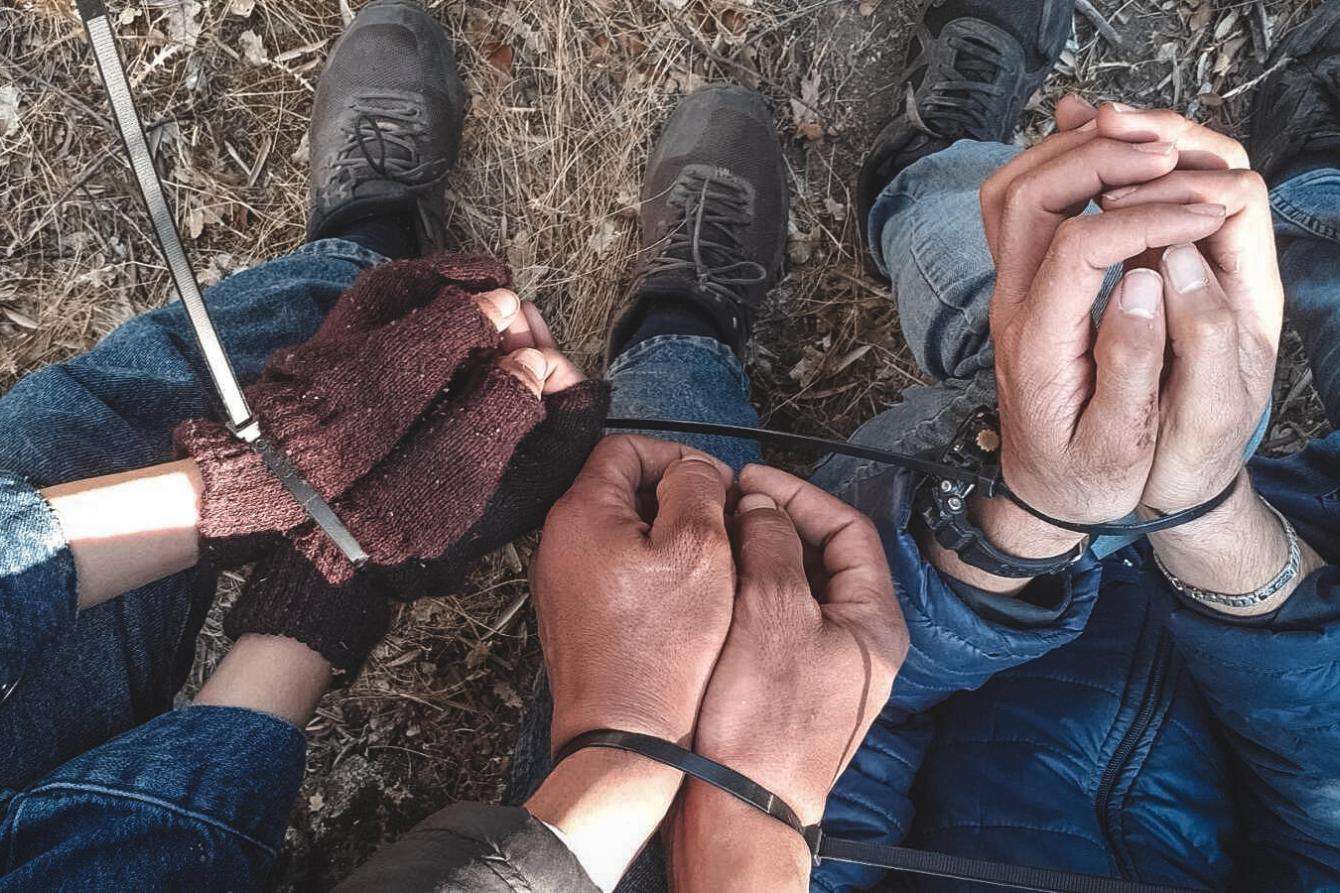
European states, in particular France, Belgium, and the UK, are increasingly using age assessments as a way to deny access to protective status to children traveling alone.
Even though claimants should presumptively be treated as minors until a final determination is made by a tribunal, minors rejected at first instance by child welfare services are denied access to assistance while they are still waiting for the tribunal’s decision. In many cases, after receiving an initial refusal to be recognized as minors by child welfare services, these children are ultimately recognized as minors by the tribunal.
MSF assists unaccompanied minors who were not recognized as children during their age assessment. In 2021, 80 percent of the children assisted by MSF in Paris Ile-de-France and Marseille obtained protection after appealing ASE’s initial decision.
Among patients receiving mental health care in Marseille, 60 percent displayed situational reaction disorder, 28 percent PTSD, 8 percent psychotic syndrome, and 4 percent anxiety-depressive syndrome.
Sixteen-year-old MSF patient in Marseille, France in 2023
Telling the assessors about my journey made me live through the trauma again
“In January 2022, I took a boat from Morocco—a trip I want to forget. I was locked up for weeks in a house with other children and men. We went through the desert [in a truck] and the trip was incredibly difficult. When we arrived on the coast, they asked us to board a dinghy. I was very scared because I had never seen the sea. Some of the kids next to me were throwing up, the waves had soaked all our clothes, I was shaking with cold.

At what cost?
MSF asks EU leaders: At what cost will they continue to double down on these harmful policies and practices? How many lives are worth sacrificing? People are tortured in Libyan detention centers; drowned at sea; killed, maimed, and ill-treated at and within EU borders; lose their loved ones; and suffer immeasurable hardship and brutality along their journey only to be met with barriers preventing them from seeking refuge.
The current reforms to EU policy provide no remedy or solution to this violence. Violence at EU borders and a lack of safe legal pathways to refuge will force people to continue resorting to increasingly perilous routes, leading to more suffering and death.
“The decision to enable and promote policies of violence and deprivation against refugees and migrants, rather than looking at humane political solutions, should shock the collective conscience,” said Julien Buha Collette, MSF operational team leader. “Instead, we see EU leaders doubling down and even celebrating inhumane policies in political rallying cries. This directly contradicts the core values the EU claims to stand for.”
For years, MSF has been sounding the alarm about the human cost of European migration policies, issuing countless reports, statements, and letters proposing recommendations to guarantee protection, assistance, and access to timely and quality care for people trying to reach Europe. Yet opportunities for meaningful change have been squandered. The EU must urgently confront the issues that lie at the root of this violence, including deep-seated dehumanization, racism, and criminalization of asylum seekers, refugees, and migrants from non-European countries. This requires a fundamental change of course and meaningful solutions to prevent senseless deaths, injuries, and long-term traumas inflicted upon people seeking protection at EU borders.
